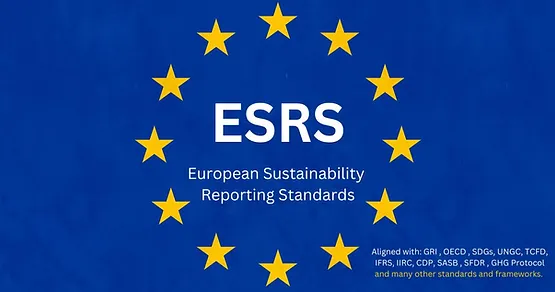In today’s global landscape, where environmental concerns and social responsibility play increasingly pivotal roles, the adoption of ESRS European Sustainability Reporting Standards (ESRS) in Corporate Social Responsibility (CSR) reporting offers a multitude of benefits. Let’s delve into the advantages of integrating ESRS into CSR reporting practices.
Enhanced Transparency and Credibility
One of the foremost advantages of adhering to ESRS in CSR reporting is the heightened transparency and credibility it brings to organizations. By following standardized reporting frameworks, companies can provide stakeholders with clear, comparable, and reliable information about their sustainability efforts. This transparency fosters trust among investors, consumers, employees, and other stakeholders, bolstering the organization’s reputation and credibility.
Improved Stakeholder Engagement
ESRS facilitates more effective engagement with stakeholders by providing them with comprehensive insights into an organization’s sustainability performance. By aligning CSR reporting with internationally recognized standards, companies can better address stakeholder concerns, solicit feedback, and build stronger relationships. This increased engagement not only enhances accountability but also enables organizations to respond more adeptly to stakeholder expectations and preferences.
Facilitation of Benchmarking and Performance Comparison
Implementing ESRS in CSR reporting enables organizations to benchmark their sustainability performance against industry peers and global standards. By utilizing consistent metrics and methodologies, companies can assess their progress over time and identify areas for improvement. Furthermore, stakeholders can compare the sustainability performance of different organizations more accurately, facilitating informed decision-making and incentivizing competition to drive continuous improvement.
Mitigation of Risks and Opportunities Identification
ESRS-compliant CSR reporting helps organizations mitigate risks associated with environmental, social, and governance (ESG) factors while also identifying new opportunities for sustainable growth. By systematically assessing and disclosing ESG risks and impacts, companies can proactively manage these issues, reduce vulnerabilities, and capitalize on emerging market trends and consumer preferences. This proactive approach not only enhances resilience but also positions organizations to seize competitive advantages in an increasingly sustainability-focused marketplace.
Cost Savings through Efficiency Improvements
Adopting ESRS in CSR reporting can lead to significant cost savings for organizations through efficiency improvements and resource optimization. By identifying inefficiencies in energy usage, waste management, supply chain operations, and other areas, companies can implement targeted initiatives to reduce costs and minimize their environmental footprint. Moreover, transparent reporting on sustainability performance can attract investors seeking to support environmentally responsible businesses, further enhancing financial sustainability in the long run.
Alignment with Regulatory Requirements and Investor Expectations
ESRS compliance ensures that CSR reporting aligns with evolving regulatory requirements and investor expectations, reducing compliance risks and enhancing access to capital. As governments worldwide implement stricter regulations on ESG disclosure and reporting, companies that adhere to ESRS are better positioned to meet these obligations seamlessly. Additionally, transparent and standardized CSR reporting can attract socially responsible investors who prioritize sustainability criteria in their investment decisions, thereby expanding access to capital and lowering the cost of capital.
Fostering Innovation and Long-Term Value Creation
By integrating ESRS into CSR reporting, organizations can foster a culture of innovation and drive long-term value creation. Through systematic measurement, reporting, and stakeholder engagement, companies can identify opportunities for innovation across their value chain, from product design and production processes to distribution channels and customer engagement. By embracing sustainability as a driver of innovation, companies can enhance their competitive positioning, attract top talent, and create enduring value for both shareholders and society at large.
Conclusion
In conclusion, the adoption of ESRS European Sustainability Reporting Standards in CSR reporting offers myriad advantages for organizations seeking to enhance their sustainability performance and create long-term value. From enhanced transparency and stakeholder engagement to cost savings and regulatory compliance, ESRS-compliant reporting enables companies to effectively manage risks, seize opportunities, and contribute to a more sustainable future. By embracing ESRS, organizations can not only bolster their reputation and credibility but also drive innovation, foster resilience, and ultimately thrive in a rapidly evolving business landscape characterized by heightened environmental and social consciousness.
Top of Form


